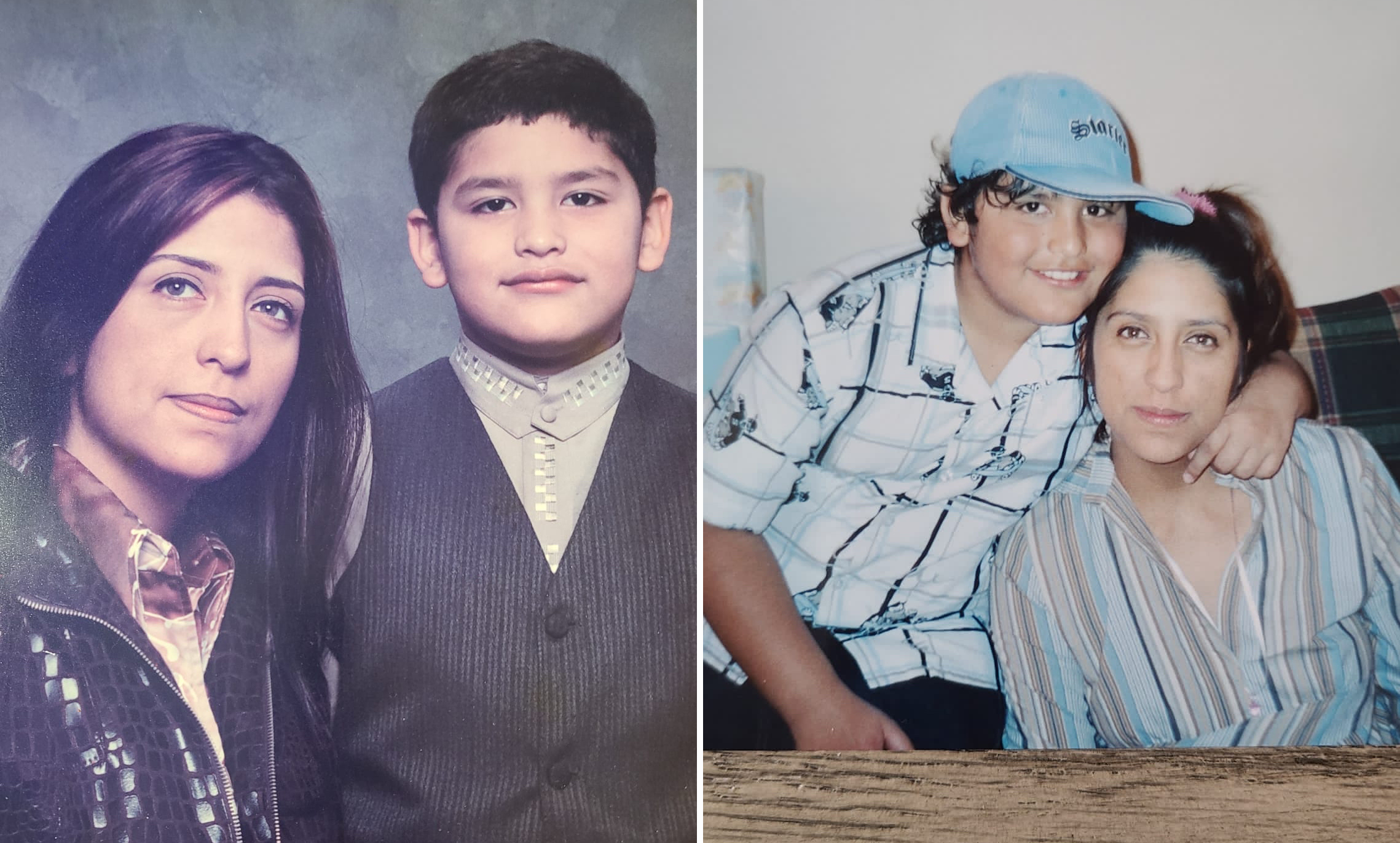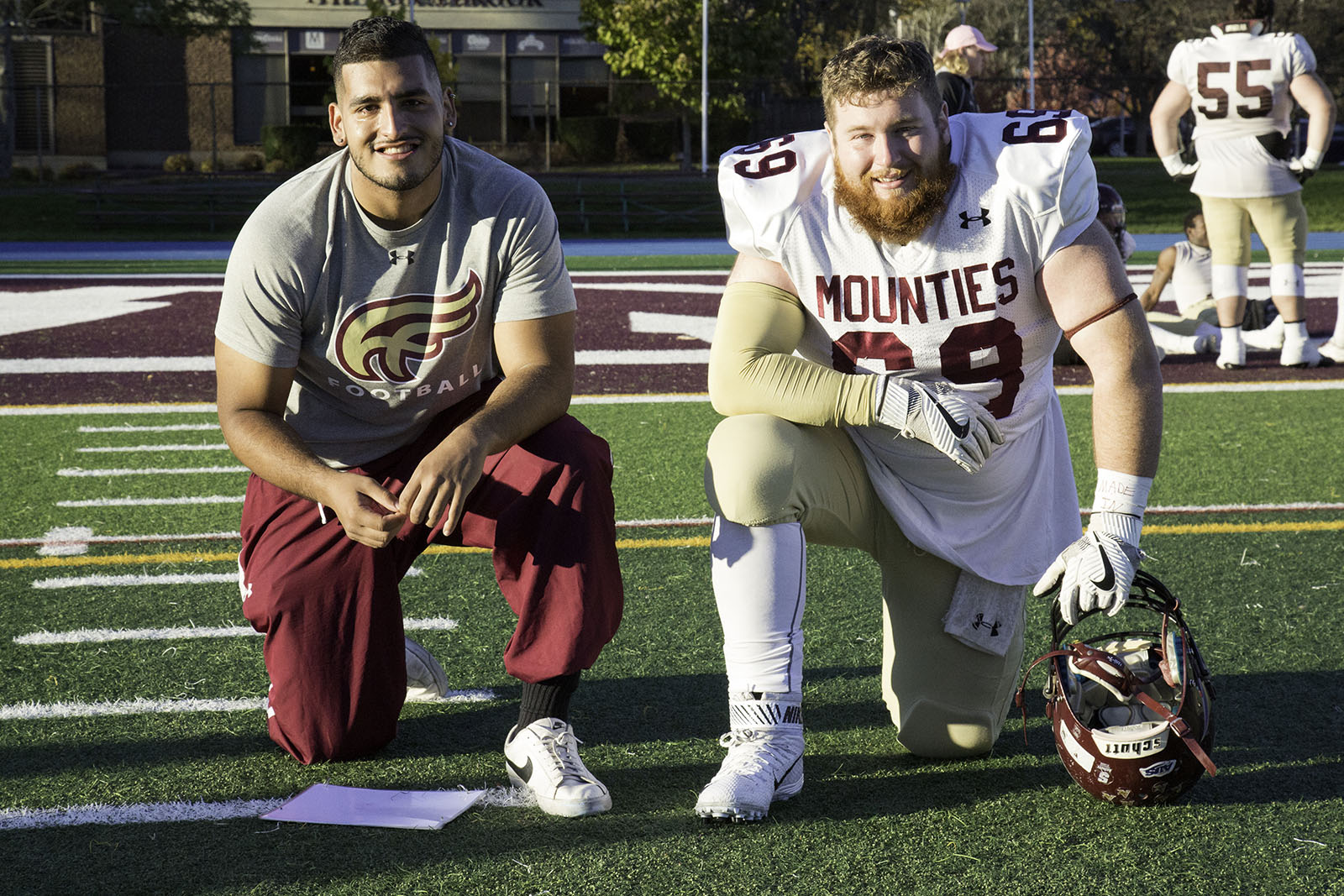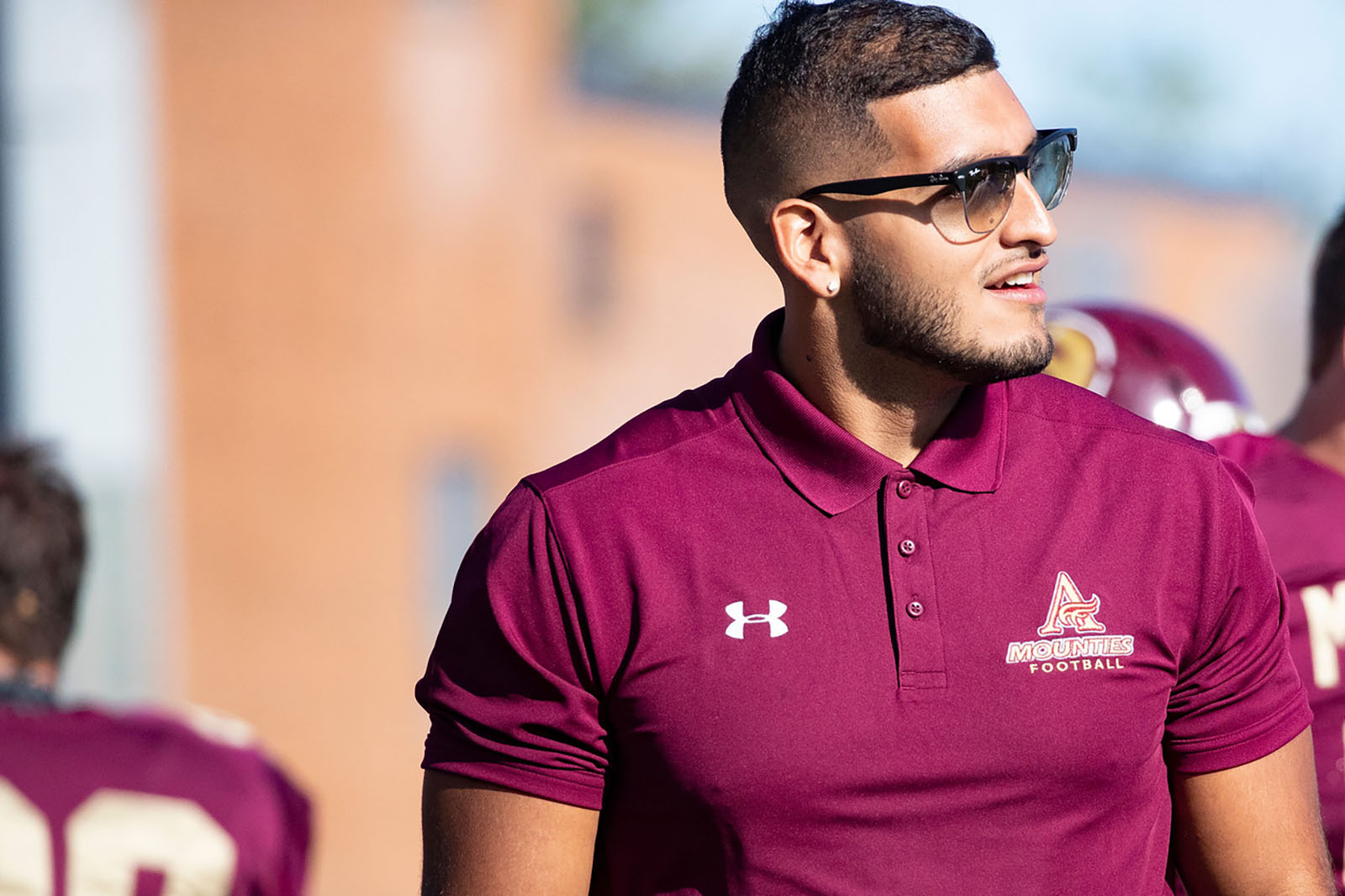An Angel's angel
When we hop onto Zoom, I know by the time we get “It’s nice to meet you” out of the way that the Class of 2020’s Angel Farias is likeable. Not the kind of likeable that grows on you. But rather, the instantly-likeable kind.
He’s warm, polite, well-spoken. He’s driven, confident, and, at the midway point of his Bachelor of Education at the University of Ottawa, knows where he’s headed. When it comes to the story of his early life, he’s a straight shooter, strong enough to show vulnerability.
And his mom, a hard-working Argentinian woman named Patricia — an Angel’s angel if ever there was one — doesn’t have a bit to do with any of this.
Rather, she has everything to do with it.
For the first five years of his life, Angel and a young Patricia lived with his grandmother in Argentina, where he admits to being the fiercely-loved first grandchild. When Patricia made the difficult decision to leave in search of opportunity that didn’t exist in their country, so she could send money back home to the family, she was taking her son with her.

She spoke no English, had no network, and was unemployed. Newly in Toronto, she found work as a cleaner — a vocation she would do well and with integrity for many years. In the early days, luxuries like childcare were nonexistent, so she was forced to take Angel to work with her, hiding him in her cleaning trolley. She’d have him wait for the duration of her shift in one of the supply closets.
“I struggle to think about it. What she went through,” he says. “Life throws things at you. That’s the big thing my mom taught me: things will happen, but you control your own narrative.”
Housing wasn’t easy to come by. And when a friend agreed to lend Patricia a car — not just to drive, but to sleep in — it became their temporary home.
“I don’t have many memories from that time,” he says. “I just have so much respect for her, doing whatever it took to get by.”
Consistency and community were perks still many years away, and from kindergarten to Grade 8, Angel attended nine different schools in order to streamline logistics for Patricia to get to cleaning jobs.
“The moving was hard. It was tough to make friends. I was shy, overweight. I was frustrated at times,” he says. “But it helped me learn that no matter what life hands you, you’ve got to stride along with it.”
When he graduated from Grade 8, he remembers his mom — a woman who appreciates, he tells me, any ceremony that represents accomplishment — pleading with him: “Just give me one more graduation.”
“What people may not understand,” he explains, “is that to be able to stay in school past Grade 8 is a privilege. There are kids who need to help support their families.”
While Angel ultimately did stay in school, he also did his part to contribute to the household budget. He joined his mom on the cleaning crew, which meant long shifts after school — getting home at 1 a.m. His schoolwork was not a priority at that point. Survival was.
While he had yet to develop a schoolwork ethic, what was emerging was an undeniable work ethic overall.
“We cleaned banks, and my job was to take out all the garbage, so I’d make it a game. I would time myself. ‘Last time it took me 15 minutes, so this time, maybe I can do it in 10,’” he laughs. “When you clean banks, you’re paid by the job, so it’s all about how fast you can go. I learned that sometimes you just have to put your head down and get the job done.”
But in Grade 9, something happened. As a child he recognized that organized sports — the fees, the jerseys, the travel — were an extravagance beyond the family budget. He was about to get his first taste of team life.
When the high school football coach encouraged him to try out, Angel was terrified. Once he got over the initial discomfort of squeezing his size 12 feet into an old pair of size 9 soccer cleats, he liked it — a lot. Not only was he good at it, football represented a new perspective.
“Football took my stress away,” he says. “When you’re on the field, privilege goes away. I feel so blessed the coach forced me to try to something I never had before.”
Football would go on to open doors he’d never otherwise imagine walking through.
By the time he graduated from high school — yes, Patricia got that one more graduation — approximately half-a-dozen university football coaches had started knocking, and yet, ironically, university wasn’t on Angel’s radar.
“When I tell you I was a bad student, I mean I was a really bad student. But then I started getting scholarship offers for football,” he remembers. “My head coach told me how the recruiting cycle works and gave me a very realistic view. He told me: ‘Schools can offer a scholarship. But if you don’t play at a certain level, it can get taken away.’ That’s something I needed to hear.”
While he admits to having no idea “how university worked,” the daughter of one of his teachers went to Mount Allison. The teacher told Angel about Mount A’s commitment to supporting students, in particular about the team at the Meighen Centre. And the connection begins.
“I knew university was going to be an incredible uphill for me,” he says. “I needed a school that was going to give me the resources to succeed.”
So two weeks after significant back surgery to relieve a herniated disk — a detail he wasn’t going to let stop him — he pulled into Sackville.
Admittedly, it was a culture shock after spending most of his life in the Toronto area.
“I’d only ever been in cities. I remember driving into Sackville, like: Where am I?” he laughs. “I didn’t know residence was a thing. I didn’t know about school spirit. I didn’t know how close people get. It blew me away.”
Despite the unknowns — and there were plenty — I ask when he realized he was somewhere special, and he’s quick to answer.
“My first day. I was lucky enough to get there during a football game. I got to see how unique the environment was. Everyone so close to the field. The people who watch every week — they know the players by name, not number,” he says. “When I went to meet the team, I was a little scared because I’d missed training camp — again, I’m the new kid — but the people I met my first day are the people I talk to every day now. That says a lot about Mount A.”

While finding his lifelong squad is a plus, he admits the shift into academics wasn’t so smooth.
“University was the first time I was able to act my age,” he says. “It was the first time I didn’t have the added responsibilities of work. And it spiraled. I just wanted to have fun. But I had a little too much.”
By Christmas of his second year, the guilt was overwhelming.
“I wasn’t sending money to the family. And I felt guilty — on top of that — because I wasn’t doing well in school and started to question: Is it worth me doing this?” he says.
The turning point occurred over the holiday break when he shared his feelings with his mom and she broke down crying.
“She explained how big of an opportunity this is. She said; ‘You’re so incredibly lucky to be there, why throw it away?’, ” he recalls. “I had to sit down and ask myself: What do I need to do to be successful? University was a big cocktail of realizations.”
When he was placed on academic suspension, the conditions he had to meet in order to stay were stringent. He’d need to work with the Meighen Centre — ironically, he’d yet to take advantage of that which initially attracted him to the University.
“I was not allowed to miss a single class or I wouldn’t play in games and I’d be kicked out of school,” he says. “I had to have tutors. I had to meet with academic advisors. It was the best thing that ever happened to me. These people care. The people who work at the Meighen Centre are so special. They’re champions for kids — especially kids with learning disabilities who are constantly told ‘university is not for you.’”
By third year, Angel had found his groove.
“It was my best year of football. I got to start. I switched positions. It was a great year.”
But then, in December, while in training, something happened. Intense shortness of breath — “the feeling I was breathing through a coffee stir-straw.” Sharp pain. And he knew what it was. One year before, he’d experienced the same, something doctors had felt was an unfortunate one-off. But here it was again: Angel was in the throes of his second pulmonary embolism, an often-fatal artery blockage of the lungs.
While agreeing he was lucky to be alive, his hematologist could not clear him to play football.
“This changed my identity. It was heartbreaking,” he says. “I was sure my fourth year would be my breakout year. I was prepared and I felt strong. With a blood clotting issue, you don’t feel any different. It was extremely hard to accept. I came to university to go pro. I saw it as a chance to help my family out of financial challenges, so it felt like not only I’d lost an opportunity but they had.”
And, so Angel did what he learned as a boy. He owned the narrative.
“Stuff happens. But how you respond is on you. And this is where I give a shout out to Mount A,” he says. “At a lot of schools, if you can’t play, the team cuts you out. At Mount A, it was the opposite. Everyone welcomed me. That’s a big Mount A thing — we take care of each other. I got to help every step of the way. I got to go to every single game, every meeting. That helped the transition for me.”

I ask what he’s most proud of when reflecting on his football career, and am expecting an answer that has to do with stats and physicality. I’m wrong.
“When the football awards came around, I won Most Improved Academic,” he says. “That is by far my biggest accomplishment.”
And now, new aspirations were taking hold.
“Dr. Ardath Whynacht was the first to mention the idea of doing more after my undergrad. ‘I noticed that you’re good at this and good at that,’ she said to me. ‘Would you ever think of doing a master’s degree?’ She put that idea in my head, and I was like, ‘Maybe I could be a teacher.’”
Fast forward, and here he is, with sights set on eventually becoming a principal. (“That’s where I could create the most change — create breakfast programs and things like that. Students can’t learn if they’re hungry.”)
I point out the beautiful irony that, while a career in the CFL would’ve provided the means to positively impact his immediate family, a career in education will allow him to positively impact tens of thousands of families; the ripple effect of his influence potentially felt for generations.
He doesn’t disagree.
“That’s been my big motivator,” he says. “The message I want to give people who feel they don’t belong is this: it’s not a weakness to reach out, it’s a strength. If you don’t know, find someone who does. I was so fortunate I found a community in Sackville to help me. I did not get here by myself. It was a team effort.”
When the time came for Patricia to celebrate yet another graduation, things were a little different for Mount A’s Class of 2020, a pandemic year. However, necessity is the mother of invention, as they say, and Facetime made it memorable for other reasons.
As the ceremony was live-streamed, Angel was in Sackville while his mom, two sisters, and step-dad were in Ontario, and — an unforeseen advantage of the times — dozens of additional family members tuned in from Argentina where they all “bawled their eyes out,” Angel says.
“After so much struggle. So much pain. It was so special. Especially seeing my mom. I know how much she sacrificed. I know those years when I was in elementary school were horrible for her — no one wants to take their kid to work. Being a cleaner, I’ve seen people be so disrespectful, and that can get you into a certain mentality. Being able to graduate was a real relief.”
When I ask what he believes Patricia’s dream was all those years ago, he doesn’t miss a beat.
“This conversation,” he says. “This conversation we are having right now is the reason she came here. Having this talk with you right now is vindication. This is everything.” As far as unforgettable answers go, I’ll take it.
Oh, and Patricia. Mark your calendar. You’ve got another graduation ceremony to attend next year.


